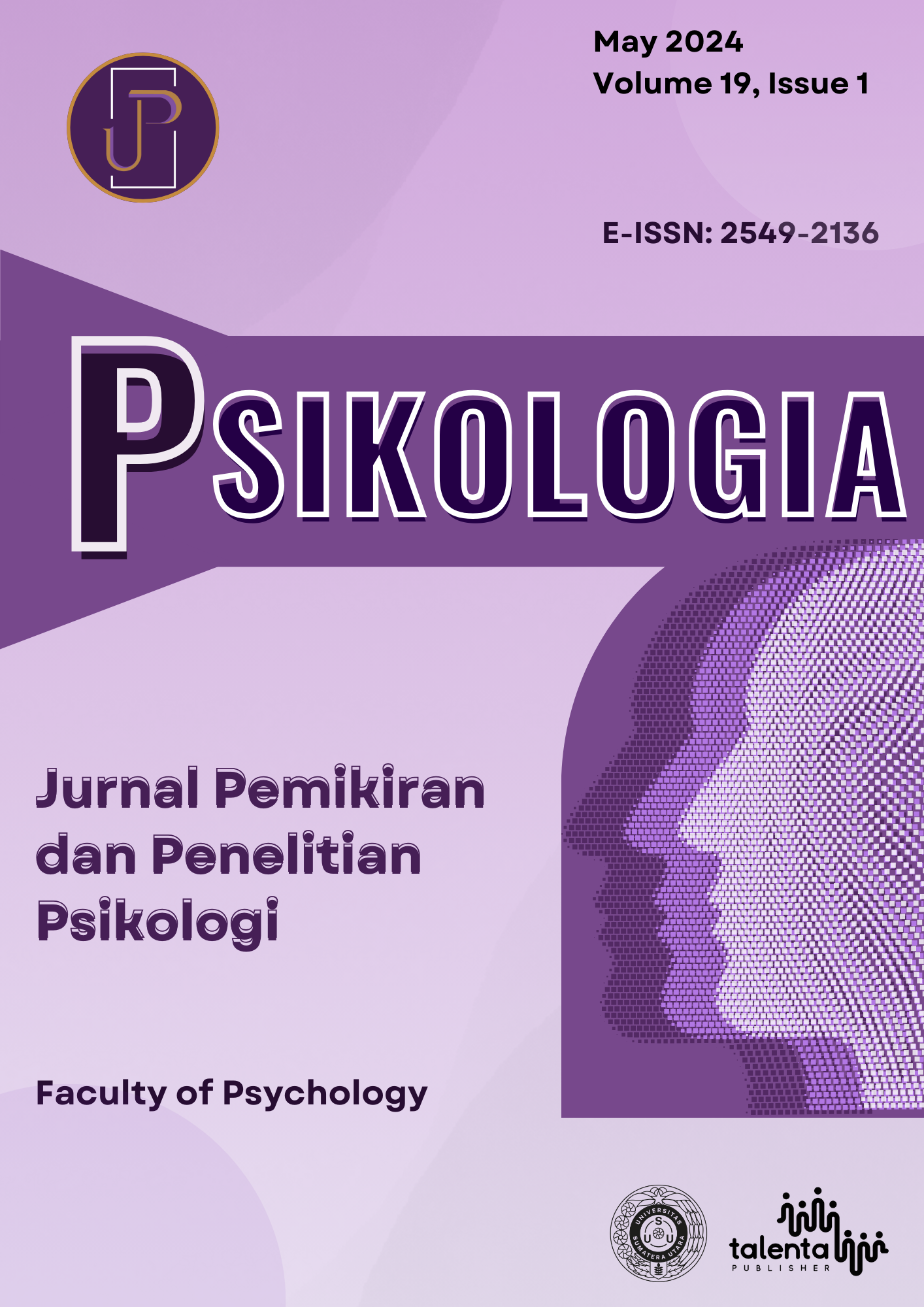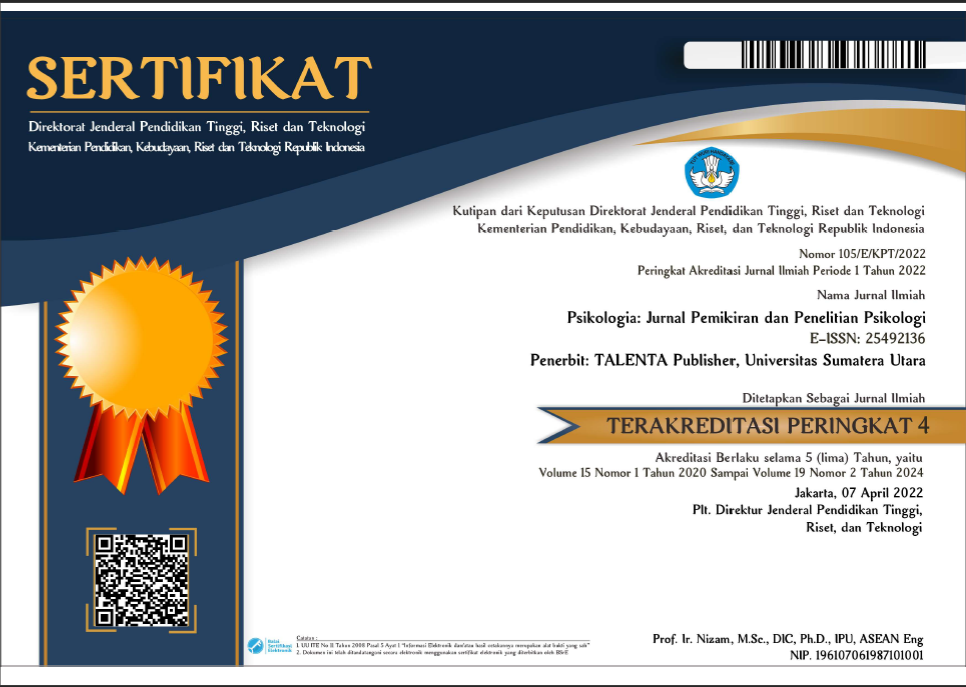Mapping employee readiness to return to work in the office after the pandemic in Indonesia
DOI:
https://doi.org/10.32734/psikologia.v19i1.15474Keywords:
readiness to work offline, readiness, workers, employeesAbstract
This research aims to see a picture of various industries and generations of workers responding to job changes with return-to-work activities in organizations (WFO). The method used in this research uses quantitative research using surveys (chairmanship). Sample data collection used a purposive sampling method, online, Google Forms, and offline, using a Likert scale. The research results involved a total of 121 respondents, with 43 male respondents and 73 female respondents, and those who did not provide information were 5 (five) people, where almost all of the respondents were from various regions or various company fields. Those mapped in this study are in the high category. It was found that management support aspects were not correlated with the control data on length of work and worker age.
Downloads
References
Astivian, D., & Pusparini, E. S. (2020). The effect of perceived organizational support and perceived supervisor support on readiness for change. The Mediating Role of Psychological Capital (May 23, 2020).
Cnn.com 2022. Analisis work from home terhadap motivasi kinerja karyawan dimasa pandemi covid-19â€. Diakses pada juni 2023 https://www.cnnindonesia.com/nasional/20220518132325- 20798044/jokowi-izinkan-lepas-masker-optimisme-pandemi-selesaiawal2023/2
Deprez, J., Van den Broeck, H., Cools, E., & Bouckenooghe, D. A. V. E. (2012). Gender differences in commitment to change: Impacted by gender or by being part of a minority group?
Holt, D. T., Armenakis, A. A., Feild, H. S., & Harris, S. G. (2007). Readiness for organizational change: The systematic development of a scale. The Journal of Applied Behavioral Science, 43(2), 232-255.
Gigliotti, R., Vardaman, J., Marshall, D. R., & Gonzalez, K. (2019). The role of perceived organizational support in individual change readiness. Journal of Change Management, 19(2), 86-100.
International Labour Organization. (2020). An Employers’ Guide on Working From Home in Response To The Outbreak of COVID-19. International Labour Office.
Kaushik, M., & Guleria, N. (2020). The impact of pandemic COVID-19 in the workplace. European Journal of Business and Management, 12(15), 9–18. https://doi.org/10.7176/EJBM/12-15-02
Kartika, L., Jayawinangun, R., & Indrawan, R. D. (2021). Efektifitas program work from home (WFH) berbasis outcome masa pandemi COVID-19. Journal of Applied Business and Economics (JABE), 7(3). 338-356
Mustomi, D., Adawia, P. R., Wijayanti, D., Ulum, K., & Arfian, A. (2021). Analisis Work From Home Terhadap Motivasi Kinerja Karyawan Dimasa Pandemi Covid-19. Publik: Jurnal Manajemen Sumber Daya Manusia, Administrasi dan Pelayanan Publik, 8(2), 131-144.
Malayuja, J., Sahputra, N., & Alfirah, A. (2022). Pengaruh work from home dan fleksibilitas jam kerja terhadap kinerja pegawai pada Direktorat Jenderal Pajak di KPP Pratama Lubuk Pakam. Prosiding Fakultas Ekonomi Dan Bisnis Universitas Dharmawangsa, 1(1), 32-37
Rakhmayanti, I. (2023). Survei: Karyawan Pilih WFO asal ga ngantor tiap hari. https://www.cnbcindonesia.com/tech/20230207134452-37-411761/survei-karyawan-pilih-wfo-asal-ga-ngantor-tiap-hari
Rothwell, W. J., Stavros, J. M., & Sullivan, R. L. (2015). Organization development, transformation, and change. Practicing organization development: Leading transformation and change, 9-25.
Susanti, R., Amelia, D. T., Damaiyana, F., & Bernadine, O. R. (2021). Produktivitas kerja saat work from home (WFH) dan work from office (WFO) pada dosen FKM Universitas Mulawarman di masa pandemi COVID-19. Jurnal Ilmiah Kesehatan Masyarakat: Media Komunikasi Komunitas Kesehatan Masyarakat, 13(1), 28-33.
Safitri, I.K. (2022, 13 Mei). Mau, tak mau, kembali ke kantor. Tempo Interaktif. https://interaktif.tempo.co/proyek/wfo-wfa-pasca-pandemi/
Dihni, V.A. (2022, 29 Juli). Survei: Mayoritas pekerja pilih bekerja di kantor pasca pandemi. Databoks Katadata. https://databoks.katadata.co.id/datapublish/2022/07/28/survei-mayoritas-pekerja-pilih-bekerja-di-kantor-pasca-pandemi
Downloads
Published
How to Cite
Issue
Section
License
Copyright (c) 2024 Hotpascaman Simbolon, Artiwinata Ginting, Johansen sipayung, Christofel Martua Aritonang, Sarah Novita Napitupulu

This work is licensed under a Creative Commons Attribution-ShareAlike 4.0 International License.









